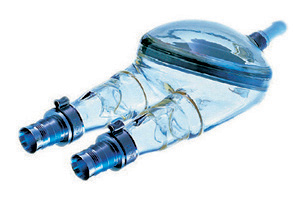35 Years of Excellence in Pediatric Heart Transplants

Back to
the top
The Program for Pediatric Cardiomyopathy, Heart Failure, and Transplantation began in June 1984 when NewYork-Presbyterian/Columbia surgeons performed the world’s first successful pediatric heart transplant in a 4-year-old boy with complex congenital heart disease. Since that time, the pioneering multidisciplinary transplant team has remained at the forefront of pediatric cardiac transplantation and heart failure, both nationally and internationally. Our transplant program has been consistently ranked in the top 3 nationally in transplant volumes, with outcomes exceeding national and local benchmarks as reported by the Scientific Registry for Transplant Recipients.
In 2018, we were number 1 in the country for pediatric heart transplant volume. Since its inception, our program has pushed the envelope for transplantation in complex congenital heart patients, providing transplants to many children who are turned down by other programs.
We specialize in transplanting children with severe pulmonary hypertension, a management protocol that we have been perfecting since the late 1980s, and have devised methods for transplanting children with effective single lung physiology, sparing both of these complex patient populations from a much higher risk heart-lung transplant. We also have extensive experience transplanting patients with failed Fontan physiology and protein losing enteropathy, arteriovenous malformations or plastic bronchitis, as well as children with preformed alloantibodies. We were the first in the U.S. to perform an across blood type heart transplant in 2001, and we routinely transplant infants across ABO blood types. Our program is recognized internationally for its excellence in transplant and has transplanted children from around the world.
Pioneering Research Initiatives
As leaders in the field of pediatric heart transplantation, our research includes being one of the founders of the Pediatric Heart Transplant Study Group in 1991, the most important prospective research database in pediatric heart transplantation. Our group has been an active research site in an NIH Specialized Centers of Clinically Oriented Research (SCCOR) grant beginning in 2004 and multiple studies through the NIH-sponsored Clinical Trials in Organ Transplantation in Children (CTOT-C) consortium beginning in 2009. Currently, we are also participating in a study of optimizing immunosuppression and decreasing side effects through the Department of Defense and another NIH-funded study to specifically detect rejection in children without the need for a heart biopsy.
Comprehensive and Family-Oriented Care
An important aspect of the Program for Pediatric Cardiomyopathy, Heart Failure, and Transplantation is providing family-centered care for all children and young adults with heart failure from various cardiomyopathies (genetic or acquired), congenital heart disease, or following chemotherapy. If a child ultimately needs a heart transplant, the same team continues to provide care seamlessly, giving the family and child muchneeded continuity. With the proper heart failure management many children may never need a transplant.
“Since its inception, the Program for Pediatric Cardiomyopathy, Heart Failure, and Transplantation has pushed the envelope for transplantation in complex congenital heart patients, providing transplants to many children who are turned down by other programs.”— Dr. Linda J. Addonizio, Director
Our team has an integrated cardiogenetics program allowing for sophisticated genetic analysis to help make a diagnosis, as well as determine family members’ or future family members’ risk to develop a similar cardiomyopathy. The Children’s Cardiomyopathy Foundation (CCF) recognizes medical centers that provide high-quality cardiac care and specialized disease management for children with cardiomyopathy. We have been designated as a CCF-Accredited Center of Care Program, not only for our outcomes, but also for our participation in multiple NIH and industry-sponsored trials related to genetics, cardiomyopathy, and heart failure. We are able to offer our patients the most up-to-date therapy and access to promising newer treatments and trials that are not offered at all institutions.
Our dedicated team consists of six highly trained heart failure and transplant physicians, five specialized nurse practitioners, one transplant nurse coordinator, as well as our administrative assistants and child life specialist who work together to provide an individualized and comprehensive diagnostic and therapeutic plan for each child and their family.
Under our care and with the creative expertise of our pediatric heart surgeons, nearly 600 infants and children have been successfully transplanted since 1984 with excellent long-term outcomes. Advances we have achieved in pediatric heart failure and transplantation have changed the lives of children who decades ago would not have survived. So many of our infants and children that were transplanted years ago are now grown up and thriving members of society, including many college graduates and many with families of their own.
Advancing Assist Devices

Berlin Heart
The Mechanical Assist Program at NewYork-Presbyterian Morgan Stanley Children’s Hospital provides lifesaving support options for children with severe heart failure waiting for transplant or recovery of the function of their own heart. Mechanical assist devices are needed in 18 to 26 percent of patients transplanted every year, highlighting the need for more organ donation. In our program this number approaches up to 50 percent speaking to the complexity and acuity of the patients that we serve.
Since 1992, our team has pioneered the use of multiple different ventricular assist devices for children of all ages and sizes as a bridge-to-heart recovery or transplant. In 2016, our team implanted a Berlin heart ventricular assist device in the youngest patient ever to receive one – an infant only one day old. After four weeks on the device she underwent successful heart transplantation. She is today a normal active and healthy 3-year-old. We are currently participating in the multi-institutional NIH-funded PumpKIN trial of the Jarvik 2015, a ventricular assist device aimed to support the smallest of our patients while minimizing complications encountered with other systems of mechanical support.



